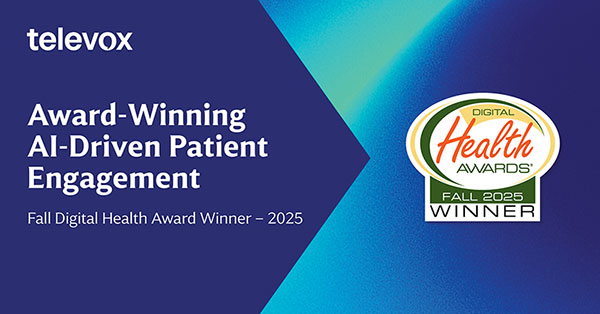Televox is proud to announce that its Enterprise Edition SMS solution has been awarded Gold…

Burned Out, Short Staffed and Fed Up: How a Digital Patient Engagement Platform Can Give Staff a Break
By: Ryan Vowles, Marketing Manager at TeleVox
Maintaining routine communication with patients is critical to ensure individuals remain in touch with care teams, show up for healthcare visits and stay engaged in treatment for health issues they may be experiencing. But the majority of hospitals and health systems are experiencing significant staffing constraints today, which means their clinicians and support staff are already tasked with long, daily to-do lists. Unfortunately, these “to-dos” often include hours of manual, repetitive phone calls and voicemails with reminders about recommended visits. Because of this, organizations should consider a digital patient engagement platform to boost visit volumes, improve care, and give staff a break.
The Power of an Automated, Digital Patient Engagement Platform
Today’s automated engagement technology is poised to take a load off of your staff, considering many of these individuals are more overworked—and overwhelmed—than ever. One industry survey asked healthcare leaders and clinicians about their biggest challenge when it comes to integrating patient engagement into care delivery. The answer from the majority of respondents (63%) was time.
Fortunately, advanced platforms can replace what would be manual, repetitive patient outreach and engagement for a variety of communication touchpoints patients want and need, including sending automated SMS texts and voice calls related to:
- Appointment self-scheduling and rescheduling
- Pre-visit instructions and pre-procedure prep
- Transition care
- Post-procedure follow-up
- Recall for preventive care, vaccinations and routine appointments
- Referral management
Two-Way Changes the Game
Automating outreach—for everything from appointment reminders to a notification that a referral is ready to schedule—is just half of the solution, however. When considering a digital patient engagement platform that can truly make a difference in the lives of your staff and patients, two-way capabilities are a must. This approach mimics dialogue typically conducted by healthcare teams, and enables bidirectional communication between patients and your organization.
Because of this, patients will be encouraged to interact and respond when it’s convenient for them. And a whopping 92% of Millennial patients want complete two-way electronic communication with their healthcare providers—this includes self-scheduling and rescheduling from a simple SMS message. However, recent data about health systems’ patient engagement strategies shows that only 11% of surveyed executives report texting as a top channel used at their organization, indicating this two-way technology hasn’t been widely adopted.
Seamless Integration is Yet Another Win for Staff
While automation can streamline communications, eliminate labor-intensive outreach, and trigger action, the right digital patient engagement platform should offer equally seamless campaign setup and implementation. To accomplish this, look for an engagement solution that deeply embeds within the electronic health record (EHR). This integration means there is zero manual data entry required, because patient responses are documented into this system automatically, but perhaps more importantly, your staff don’t have to spend time getting up to speed with yet another platform. There’s little to no learning curve with truly embedded engagement technology, and staff members are able to self-service campaigns using EHR features they know and use every day. A deep level of integration also makes it easy to tailor communications based on the data contained in the EHR—including rules for scheduling and timing messages based on whether patients are due or overdue for certain care.
To dive into more detail about how the right digital patient engagement platform can transform how and where your staff spend their valuable time, including real-world workflow examples of these campaigns in action, read our latest eBook.



